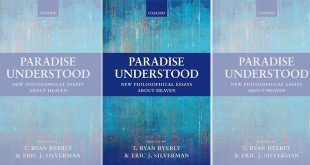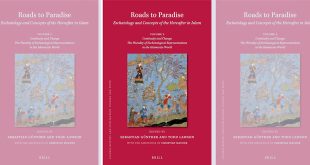Since its completion in the seventeenth century, this book, a translation of Al-Haqa’iq fi Mahasin al-Akhlaq, has been lauded as a valuable textbook on Islamic spirituality and ethics as well as a spiritually enlightening read....
Read More »Enlightening Students in the Laws of Religion: Tabṣirat al-Mutaʿallimīn fī Aḥkām al-Dīn
Tabṣirat al-Mutaʿallimīn fī aḥkām al-dīn is a seminal work in Twelver Shia Islamic jurisprudence. It systematically outlines the principles and rulings of Sharia law (fiqh), covering acts of worship, transactions, punishments, and social responsibilities....
Read More »Paradise Understood: New Philosophical Essays about Heaven
T. Ryan Byerly and Eric J. Silverman have edited an impressive collection of 17 new essays dealing with these and other problems related to the possibility and desirability of Heavenly existence, its presuppositions, and its implications All of the essays are of the highest standard of analytic theology, and I can only recommend the book to anyone interested in one of the most important themes of theological reflection concerning the Christian hope for the world to.....
Read More »Islam, Law and the State in the Philippines
This book investigates the development of Islam in the Philippines from a legal perspective, investigating Islam through the lens of the institutions of Islamic law....
Read More »Invoking the Invisible in the Sahara: Islam, Spiritual Mediation, and Social Change
Invoking the Invisible in the Sahara situates battles over the meaning and control of Islamic esoteric knowledge (ḥjāb) in Mauritania's history of racial and political struggles dating to the pre-colonial era. Innovatively using contemporary social media alongside traditional textual and oral sources, Pettigrew reveals the resilience and adaptability of both ḥjāb power and practitioners. ‘Magic' in Mauritania has not disappeared; it has become a marketable commodity....
Read More »Bahāʼ al-Dīn al-‘Āmilī and the Visual Arts
This essay examines the significant yet often overlooked role of Shaykh Bahāʼ al-Dīn al-'Āmilī in the visual arts of Early Modern Iran. Highlighting his documented associations with architecture and the evolution of his portraiture, the work argues that his portrayal in...
Read More »Roads to Paradise: Eschatology and Concepts of the Hereafter in Islam +PDF
Roads to Paradise: Eschatology and Concepts of the Hereafter in Islam offers a multi-disciplinary study of Muslim thinking about paradise, death, apocalypse, and the hereafter...
Read More »Feminist Theology and Social Justice in Islam: A Study on the Sermon of Fatima
This book explores the intersection of theology and women’s studies, centering around the influential figure of Fatima within Shiʿi theology. By examining Fatima’s sacred role and her impact on empowering women and political minorities, the manuscript offers a textual analysis of....
Read More »New Release: Living Islam: Muslim Expressions of Faith
Living Islam invites readers to appreciate ways in which Muslims from diverse backgrounds and traditions interpret and experience their faith. Adopting a cultural studies approach, Ali Asani begins by posing questions such as 'Which Islam?' and...
Read More »Shaykh Mufid: An Annotated Bibliography
The present research includes two parts: first, a descriptive bibliography of primary works by Mufīd (i.e., written by Mufīd himself, dictated by him, or selected from his works); and second, a bibliography of contemporary secondary literature on Mufīd and his works....
Read More » Ijtihad Network Being Wise and Faithful Muslim in the Contemporary World
Ijtihad Network Being Wise and Faithful Muslim in the Contemporary World









